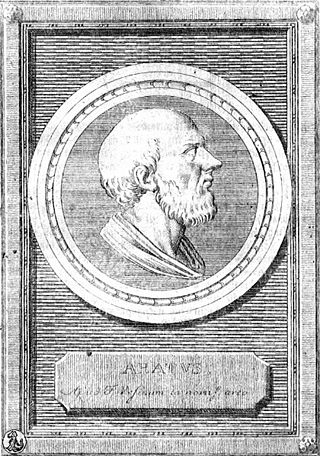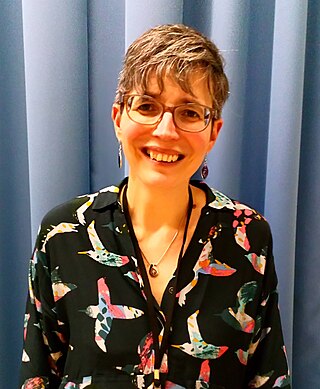
Publius Ovidius Naso, known in English as Ovid, was a Roman poet who lived during the reign of Augustus. He was a younger contemporary of Virgil and Horace, with whom he is often ranked as one of the three canonical poets of Latin literature. The Imperial scholar Quintilian considered him the last of the Latin love elegists. Although Ovid enjoyed enormous popularity during his lifetime, the emperor Augustus exiled him to Tomis, the capital of the newly-organised province of Moesia, on the Black Sea, where he remained for the last nine or ten years of his life. Ovid himself attributed his banishment to a "poem and a mistake", but his reluctance to disclose specifics has resulted in much speculation among scholars.

Marcus Manilius originally hailing from Syria, was a Roman poet, astrologer, and author of a poem in five books called Astronomica.
The name Cydippe is attributed to four individuals in Greek mythology.

In Greek mythology, Oenone was the first wife of Paris of Troy, whom he abandoned for Helen. Oenone was also the ancient name of an island, which was later named after Aegina, daughter of the river god Asopus.

Aratus was a Greek didactic poet. His major extant work is his hexameter poem Phenomena, the first half of which is a verse setting of a lost work of the same name by Eudoxus of Cnidus. It describes the constellations and other celestial phenomena. The second half is called the Diosemeia, and is chiefly about weather lore. Although Aratus was somewhat ignorant of Greek astronomy, his poem was very popular in the Greek and Roman world, as is proven by the large number of commentaries and Latin translations, some of which survive.
MD, Md, mD or md may refer to:

The Achilleid is an unfinished epic poem by Publius Papinius Statius that was intended to present the life of Achilles from his youth to his death at Troy. Only about one and a half books were completed before the poet's death. What remains is an account of the hero's early life with the centaur Chiron, and an episode in which his mother, Thetis, disguised him as a girl on the island of Scyros, before he joined the Greek expedition against Troy.
Ibis is a curse poem by the Roman poet Ovid, written during his years in exile across the Black Sea for an offense against Augustus. It is "a stream of violent but extremely learned abuse," modeled on a lost poem of the same title by the Greek Alexandrian poet Callimachus.

The Heroides, or Epistulae Heroidum, is a collection of fifteen epistolary poems composed by Ovid in Latin elegiac couplets and presented as though written by a selection of aggrieved heroines of Greek and Roman mythology in address to their heroic lovers who have in some way mistreated, neglected, or abandoned them. A further set of six poems, widely known as the Double Heroides and numbered 16 to 21 in modern scholarly editions, follows these individual letters and presents three separate exchanges of paired epistles: one each from a heroic lover to his absent beloved and from the heroine in return.
Sabinus was a Latin poet and friend of Ovid. He is known only from two passages of Ovid's works.
Elaine Fantham was a British-Canadian classicist whose expertise lay particularly in Latin literature, especially comedy, epic poetry and rhetoric, and in the social history of Roman women. Much of her work was concerned with the intersection of literature and Greek and Roman history. She spoke fluent Italian, German and French and presented lectures and conference papers around the world—including in Germany, Italy, the Netherlands, Norway, Argentina, and Australia.

Gian Biagio Conte is an Italian classicist and professor of Latin Literature at the Scuola Normale Superiore of Pisa.
Don Paul Fowler was an English classicist.
Materiali e discussioni per l'analisi dei testi classici is an Italian periodical within the realm of classical philology founded in 1978.
Angelo Sabino or in Latin Angelus Sabinus was an Italian Renaissance humanist, poet laureate, classical philologist, Ovidian impersonator, and putative rogue.
An epistolary poem, also called a verse letter or letter poem, is a poem in the form of an epistle or letter.

In classical studies the term epyllion refers to a comparatively short narrative poem that shows formal affinities with epic, but betrays a preoccupation with themes and poetic techniques that are not generally or, at least, primarily characteristic of epic proper.
Alison Ruth Sharrock is an English Classics scholar. She has been Professor of Classics at the University of Manchester since August 2000. In 2009, she gave the Stanford Memorial Lectures. Together with David Konstan of Brown University, she edits the series Oxford Studies in Classical Literature and Gender Theory published by Oxford University Press.

Jennifer Ingleheart is a British classical scholar, who is known for her work on Ovid, Classical reception, and the influence of Rome on the modern understanding of homosexuality. She is Professor of Latin at the University of Durham.

Helen V. Lovatt is Professor of Classics at the University of Nottingham. She is known in particular for her work on Latin epic literature especially from the Flavian period.










